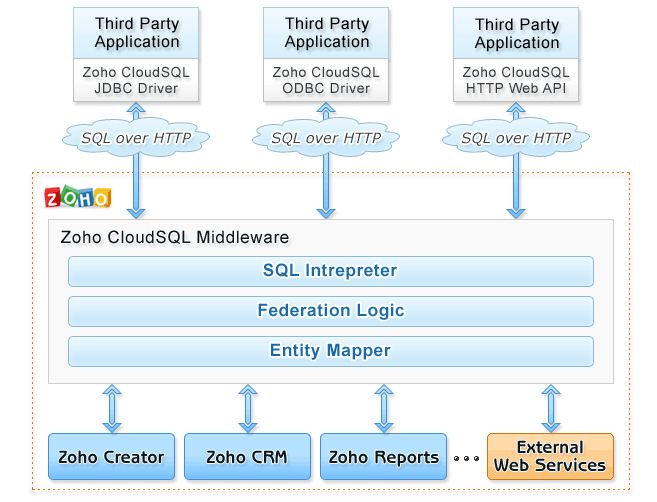Zoho's CloudSQL: a real step forward

Zoho just can't stop churning out software. Today it is launching the Zoho CloudSQL. Put simply, this is the first step to providing a cloud based integration framework that allows developers to pass data between Zoho applications and their own. This is exciting stuff. For the first time, a commercial software vendor is providing an easy way to interoperate with its applications without imposing an entry or exit visa tax.
From the release:
- It's the first technology that allows customers to interact with their data on the cloud, from another cloud application or from an on-premises one through real SQL.
- It supports multiple SQL dialects. We support all the major (and even some not so major) ones: ANSI, Oracle, SQL Server, IBM DB2, MySQL, PostgreSQL and Informix.
- With our JDBC/ODBC drivers, developers can access data in the cloud just as easily as if it were stored in a local database.
I caught up with Raju Vegesna to get a feel of what the company intends: "You can think of CloudSQL as a linking mechanism for things like QuickBooks or any application that wants to talk to and from Zoho data." That's exactly where I hoped Zoho would position the service.
Like it or not, cloud based accounting (AaaS anyone?) is a niche area with the world remaining firmly in on-premise land. While I see plenty of examples coming out to address the SMB market, it's going to take time before finance types will trust corporate transaction data in the Internet cloud. Making it easy to consume services in an integrated manner without the distinction of whether the data is on premise or in the cloud is an incredibly smart move. It means that you don't have to throw out your existing accounting applications if you don't want to while opening up the business to other scloud ervices that are gaining traction. The obvious candidate is CRM but it could equally be SCM or talent management.
I also asked Raju what will happen with existing Zoho applications. Right now, they represent a great toolkit but little integration work has been done to turn them into a ready to consume suite of services. "The company has made a start by demoing a simple report demo but yes over time we plan to use CloudSQL as the integration point for all the apps."
CloudSQL is a development environment and not for the end user. Its potential to open up a whole ecosystem category of its own is enormous. The big complaint of all business users is the general lack of integration capabilities between different applications. Taking this step puts Zoho out in front with something that has broad appeal, including the open source crowd.
However, before running off thinking this is some sort of Holy Grail, integration calls for much more than a few SQL calls and a Web API. Orchestrating services and events is where larger businesses would like to be. Even so, it gives the SMB a real chance to mix 'n' match services the way they want to get things done. In that regard, it removes vendor lock-in and allows for the emergence of genuine vertical market applications on a scale we've not seen in the past.
It will be interesting to see how Zoho follows this up and how it supports the ecosystem that congregates around its API.
